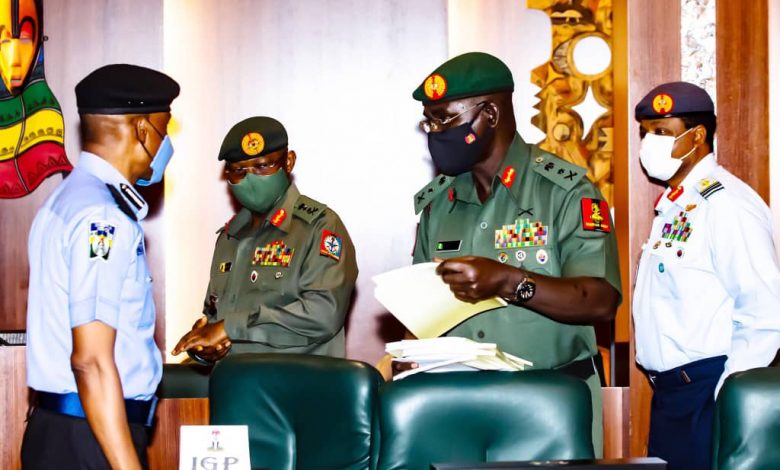President Buhari Rebukes Service Chiefs But Retains Them In Their Jobs

President Muhammadu Buhari has told Armed services chiefs that their best is not good enough as regards the security challenges in the country.
The president in a meeting with security heads on Thursday said that excuses would no longer be tolerated and that he expected them to live up to expectations going forward.
Addressing state house correspondents at the end of the meeting, the National Security Adviser, retired Maj.-Gen. Babagana Monguno, said the president was briefed on how the rising security challenges across the country were being tackled.
Monguno said the president expressed displeasure over the lack of synergy among the security forces and asked them to work together to solve the nation’s security challenges.
On Monday, a group of Civil Society organizations “ Coalition Against Killings in Northern Nigeria in a joint statement, called on the president to sack his Service Chiefs, following their inability to end incessant killings in the country in spite of the fact that they had been on the job for nearly five years.
The president has remained silent on the tenure expiration, extension, or reappointment of the service chiefs, whose statutory second term tenure have ended and stretched for an additional six months.
Gen. Abayomi Gabriel Olonisakin, the Chief of Defence Staff, Lt. Gen. Tukur Yusufu Buratai, the Chief of Army Staff, Vice-Admiral Ibok-EteIkwe Ibas, the Chief of Naval Staff and Air Marshal Sadique Baba Abubakar, the Chief of Air Staff were appointed on July 13, 2015.
Upon completion of their initial two years, the president extended their tenures on December 18, 2017, for another two years to be completed in 2019. Retired Brig.-Gen. Mansur Dan Ali, the Defence Minister at the time, in a statement stated that the president had extended the tenures of the defence and service chiefs after “having carefully reviewed the on-going military operations across the country”.
In December 2019, the Chairman of the Senate Committee on Army, Sen. Ali Ndume, said the president could not but retain the service chiefs because there was war, not only in the Northeast but all over the country.
The tenure and appointments of the Chief of Army, Navy, Air Force and Chief of Defence Staff have become an issue of speculation due to the absence of an official statement on their future and resurgence of insecurity across the country.
The appointment and tenure of service chiefs is dictated by the 1999 Constitution of the Federal Republic of Nigeria [218 (1&2)] and the Harmonised Terms and Conditions for Service for officers (H-TACOS) (2017) Revised.
As it stands, all the service chiefs except Buratai joined the service in 1979 and have spent 40 years in service. Buratai is the youngest of them, having spent 39 years in the service which he joined in 1981.
An anonymous senior military source told HumAngle that “Regardless of Section 9 of the HTACOS, the civil service rules and HTACOS state that: “An officer may only serve a maximum of 35 years in service or attain the age of 60 years, whichever one comes first. So, in all ramifications, their continued stay violates all existing laws.”
He said aside that, “The security situation under their watch is the worst ever.
“Troops’ morale is at the lowest to the extent of soldiers publicly making videos to abuse their service chief”.
The source added that “so many senior officers were now retiring without attaining the peak of their careers of heading the military. This has made senior officers to lose faith in this system and become lackadaisical.”
“It’s uncalled for, unhealthy for the service and sets a pretty dangerous precedent. It also blatantly shows the presidency’s nepotistic disposition,” said Almeen Yaqub, a security expert tracking insecurity and Lake Chad conflict
A change has long been overdue especially given how stagnant the entire combat theatre has become, Yaqub said, adding that “emergent security threats show our poor national security planning and how desperate for fresh ideas Nigeria is.
“Nigeria’s national security strategies have mostly been reactive, rather than proactive for years now and the country is now seeing the consequences.”
Support Our Journalism
There are millions of ordinary people affected by conflict in Africa whose stories are missing in the mainstream media. HumAngle is determined to tell those challenging and under-reported stories, hoping that the people impacted by these conflicts will find the safety and security they deserve.
To ensure that we continue to provide public service coverage, we have a small favour to ask you. We want you to be part of our journalistic endeavour by contributing a token to us.
Your donation will further promote a robust, free, and independent media.
Donate HereStay Closer To The Stories That Matter




